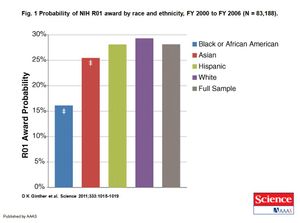A study in Science reports findings from an analysis of over 83,000 applications for R01 funding between 2000 and 2006. The researchers identified the race of the applicants to determine the likelihood of receiving an NIH grant.
They found that self-identified Asian investigators are 4% less likely and African-American investigators 13% less likely to receive funding than white applicants. The disparity went away among applications with similar priority scores.
It seems that very little in the application would distinguish the race of the principal investigator, so reviewer bias (unconscious or not) is probably not the main cause. Rather, minority applicants may receive less mentoring in how to formulate and write a proposal.